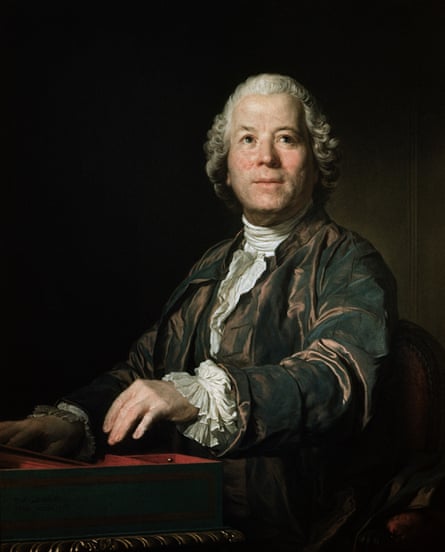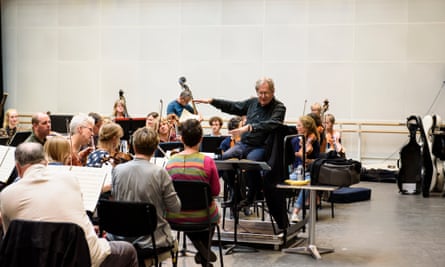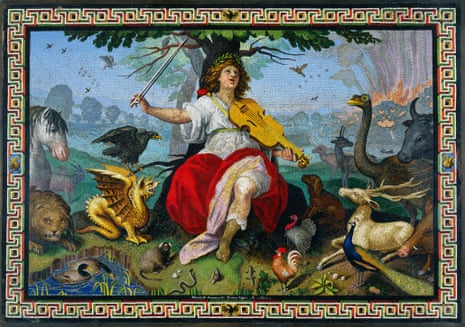The Orpheus myth is among the most ancient in western literature. In essence, it celebrates the power of art – specifically music – to vanquish death and remove its sting. Since the very origins of opera, it has also been a way of heralding rebirth. Monteverdi’s L’Orfeo of 1607 (which we gave at the Proms last month) was part of a powerful movement purporting to recapture the spirit of ancient Greek sung drama.
With his Orphée et Eurydice, Christoph Willibald Gluck tried to achieve something similar to Monteverdi, but 150 years later, and within the parameters of what had become a much more staid, conventional style. The famous manifesto arguing the need to reform opera was in fact written not by Gluck himself but by his librettist Calzabigi as a preface to the published score of Alceste (their second collaboration) in 1769. It is a piece of canny self-advertisement on Gluck’s part. Yes, it is true that Italian opera seria had got itself into a rut. There was a disconnect between the elaboration of means and the emotional and dramatic content. The outwardly simple but mesmerising, fluid style pioneered by Monteverdi had degenerated into an increasingly two-paced affair. The only means to propel the action forwards – secco recitative – had became more and more formulaic and musically perfunctory, its phrases too predictably mirroring the sectional articulation or shape of the poetry. Then, at the point where an aria was called for, the drama would come to a juddering halt. Gluck’s aim was to put the genre back on track by stripping away the sillier operatic conventions of the day, the dramatic improbability of that fissure between secco recitative and the circularity of da capo arias generally constructed to express only one emotion at a time and encrusted with showcase coloratura, cliche and over-elaboration.
Extravagant claims of originality were made for these reforms by Gluck’s admirers, at the time and later, but many are slightly dubious. In hailing Gluck as the inaugurator of a new era, Rousseau was simply riding his favourite anti-Rameau hobby horse, ignoring the fact that, unlike composers of Italian opera seria, the French had been subtly blending operatic dialogue and lyricism for the past 50 years. Rameau, Gluck’s immediate precursor, used his orchestra as the engine room of the drama to achieve remarkable musical fluidity and dramatic verisimilitude, while giving a prominent role for the chorus and a still stronger presence for dance.
To my ears, Rameau’s operas possess an intrinsic musical interest and subtlety and display a timbral palette and souplesse beyond that of Gluck’s. Yet all one’s reservations can be confounded by the touching honesty and emotional directness of Gluck’s opera scores, his theatrical nous and baffling ability to be able to ensure every single feature counts. He had the genius to make the most of his lesser compositional talents, the savvy to use them to striking dramatic effect and a unique ability to identify and then mesh the narrative and moral threads of a piece together. Above all, his music can wring your heart.
Gluck cast Orphée as an haute-contre – not just a “damned high” tenor, but one totally at ease in the upper stratosphere, able to blend voix mixte with heroic head-voice timbre. Hearing the remarkable Juan Diego Flórez in the title role may come as a shock to operagoers expecting a mezzo (or, worse, a maternal contralto), being perhaps unaware that Gluck never envisaged a woman in the title role. In his first version of Orfeo, composed for Vienna in 1762, Gluck wrote for the otherworldly voice of an alto castrato (Guadagno) in the title role. He then revised and transposed it for a soprano castrato (Millico) for a performance in Parma in 1769. His final and most radical revision (seldom performed, and the one we will be performing at Covent Garden) was made for Paris in 1774 with a high tenor (Le Gros) as warrior-hero. He opens with lacerating cries of “Euridice” over the sombre opening mourning chorus, before transcending his desolating pain and controlling it in song. Often sopranos cast as Eurydice – but not the wonderful Lucy Crowe – are too genteel to suggest the character’s heartrending despair, let alone her sensual lassitude and self-indulgent capitulation to the drugged pleasures of Elysium, her waspishness and, when provoked, her readiness to fight like a cornered tigress.

While there was much to admire in the early version, with its Attic purity and its extreme economy of means, Gluck seized on the opportunity in Paris to recalibrate his score, linking it with the conventions of French lyric tragedy, which provided more space for dance (the magical Dance of the Blessed Spirits is new in this version). This allowed him to expand in several ways – not least in the sentence construction of the orchestrally accompanied recitatives and the heightened personal expression they bring. A tenor at the top of his range, while it might not have the same otherworldly character of the castrato version, imbues Orphée with a lot more heroic valour and virile intensity. This encouraged Gluck to deviate from his own reform principles to the point of adding a convincing bravura da capo aria at the end of act 1.
One has to admit that Gluck’s French version is sometimes uncomfortably grafted on to its Italian rootstock. It seems that he only half mastered the language. The dilemma for both soloists and chorus is not just to sing in clear classical French, with all its characteristic nobility of expression and pathos (including the tendency to emphasise the weak upbeat syllable), but to fit with, around – or often against – Gluck’s remorselessly four-square harmonic rhythms (this can feel like patting your tummy with one hand and doing circles above your head with the other). As with all French opera and song, the singer’s challenge is to ensure a sense of organic growth right through to the final word of any phrase, with no temporary halt on an emphatic downbeat as there is in Italian.
Ever since making my Covent Garden debut in 1973 with his Iphigénie en Tauride, I have been captivated and frustrated by Gluck’s operas in equal measure. The look of the page of any of his scores – as with Janáček’s – can give a skewed impression of the sounds he was trying to capture. There are many examples of slapdash notation, a litter of contradictory appoggiaturas, inconsistencies and random dynamics. Gluck wrote: “My presence at the rehearsal of my works is as indispensable as the sun is to the creation.” “I can believe it!” quipped Berlioz, his most devoted admirer, “but it would have been a little less necessary if he had given himself the trouble to write with more attention.” Yet Gluck’s music, which does not seem particularly impressive in piano reduction or as “eye music”, leaps from the page in orchestral performance, especially when played with the extra bite and urgency provided by period instruments, while avoiding the thick, monotonous and soporific sound that Berlioz so rightly deplored. For, ultimately, it is not the reforming dramatist we respond to, but Gluck the consummate Italian-trained musician. His revision of Orphée raises all the issues concerning the variety of art forms that make up the world of opera – text, music, dance and spectacle – and gives us a rich amalgam, one that Berlioz admired so fervently and that we can enjoy.

But for that to happen, our challenge as interpreters is to rid Gluck’s opera of any vestiges of remoteness or venerable respectability and to release the huge emotional charge that lies beyond the beauty of its classical sobriety. It requires skill and imagination to be brought to bear on the score by all its interpreters if one is to penetrate to the heart of the drama. The storylines he chooses are, after all, not only poignant and deeply moving, they have an immediate and contemporary resonance: in Orphée, they portray a married couple striving to protect their union and love, plumbing the depths of their emotional strength and summoning the courage to make huge personal sacrifices. The task is to present this in a way that is immediate and with real intensity and truth of expression: to establish a visceral connection between two living people.
While the main company of the Royal Opera is currently away on tour performing two antihero operas, Don Giovanni and Macbeth, in Japan, here in London, habitues of this august auditorium, defined by its grand horseshoe form and operatic traditions going back to its construction in 1858, can experience a wholly different world of sounds. Besides the exceptionally high tenor, there are the pellucid timbral contrasts of an orchestra playing instruments that Gluck would have recognised from his time in Paris, and an expert choir interlocking with a virtuoso dance company, combining to give a radically different slant to this magnificent opera-ballet.
Having in the past championed and recorded both the original 1762 and Berlioz 1859 versions, I am eager to tackle this version – especially having once rashly claimed that “to revive Orphée in preference to Orfeo is tantamount to admitting that our powers of concentration and appreciation are no better than those of the butterfly-minded Parisians of the 18th century”. Let us hope the Covent Garden audiences will be more discerning!

Comments (…)
Sign in or create your Guardian account to join the discussion